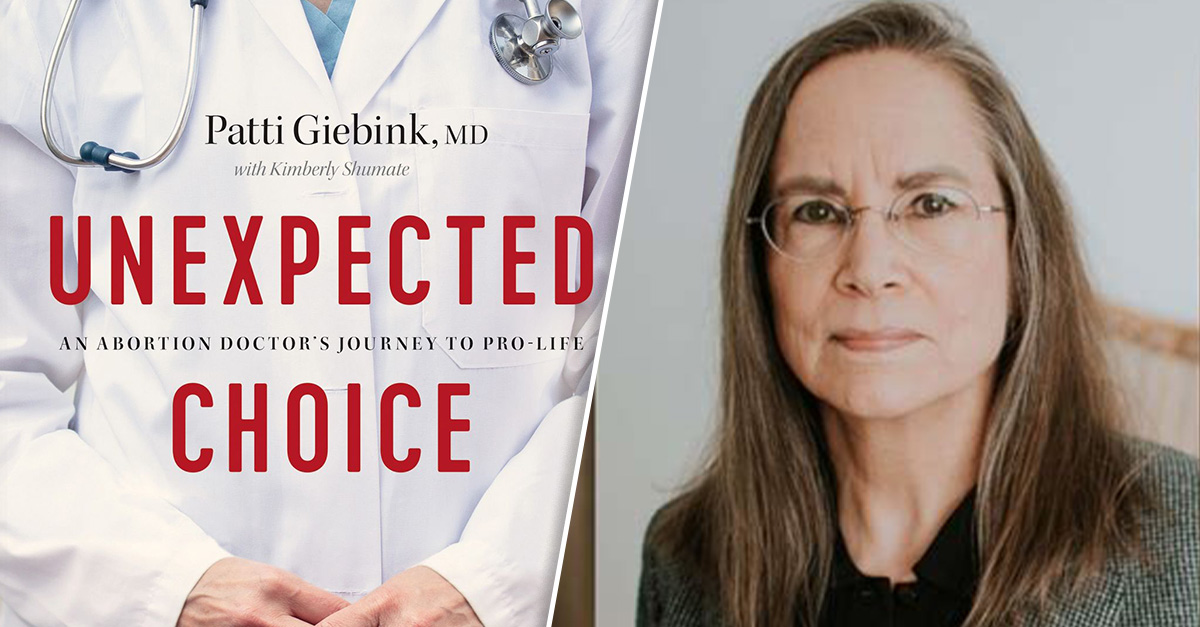


Get a free copy of Parental Rights & Education when you subscribe to our newsletter!

“I’m still a believer in women’s health, and helping women through crises. I just don’t think that ending her pregnancy is the answer.”
Dr. Patti Giebink
A clump of cells. A choice. No big deal.
Former abortionist Dr. Patti Giebink was once all-too-familiar with those words. They were used by her medical school professors to describe a developing baby in the womb as she began working toward her goal of becoming an obstetrician and gynecologist. Later, they were the words that enabled her to justify her work performing abortions.
As the fourth child of seven, the “invisible middle,” as she referred to herself, Giebink went to church regularly with her family, but never really came to know Jesus during her formative years. Her primary focus was on becoming a doctor like her father, a World War II veteran who served as a combat surgeon before returning to his civilian practice as an orthopedic surgeon.
Giebink almost followed her father into his specialty but soon decided that she would rather be an OB/GYN, than a field dominated mostly by men. Giebink was eager to make her mark. “It was just so exciting. You know, you have clinic, you have the operating room, you have labor and delivery, and there’s a lot of variety. And women are great people. So, I just sort of gravitated that way, in that direction,” she explained.
In an interview with Focus on the Family, Giebink said that the morality or even reality of abortions weren’t really discussed in medical school. At the time, “snowy” ultrasound technology wasn’t advanced enough to clearly depict that the tiny fetus was actually a human being, and professors simply referred to the unborn babies as “clumps of tissue,” These factors made it easier to accept abortion as just another medical procedure that she would have to perform in her role. Giebink didn’t give it much thought beyond that. She accepted it as one of the tasks inherent in being an OB/GYN.
She eventually started her own private practice in South Dakota but also decided to work part-time at the only Planned Parenthood in the state. Following the retirement of the primary Planned Parenthood abortionist, Giebink gave up her busy practice to become the sole doctor performing abortions in South Dakota.
Although she had also provided prenatal care and delivered babies before becoming a full-time abortion provider, Giebink never thought of the contradiction in the different roles. “At the time, the dichotomy never hit me: working hard one day to save the lives of my patients, both mothers and babies, then going to Planned Parenthood the next day to terminate pregnancies,” she recalled.
After only a year in that position, Giebink left in 1997 and moved to a smaller town in South Dakota. There, she was asked by a friend to attend a local church. And at that point, after a season of God working in her heart, Giebink realized what had been missing in her life and accepted Jesus Christ as her Lord and Savior. “Looking back, I can see the hand of God even then, protecting me, leading me on a path to Him,” she stated.
This began a radical change in Giebink’s life. She would never again perform an abortion.
While this may seem rare, Giebink is hardly the first person to recognize that abortion isn’t just a medical procedure to remove a clump of cells but the actual killing of a human being.
Abby Johnson, for example, worked for Planned Parenthood for eight years, moving up quickly to become a clinic director. In this capacity, she administered the business side of operations, hired employees, and grew revenue, but had little to do with the medical side of the house. Then, on September 26, 2009, Johnson was asked for the first time to assist with an abortion taking place in her clinic. She watched on the ultrasound as the baby writhed in pain and tried to avoid the sharp surgical instruments before ultimately losing the battle to the abortionist.
Johnson was never the same. She left Planned Parenthood, wrote a book (since made into a movie) about her experience called “Unplanned.” And she started an organization called And Then There Were None to help rescue those employed in abortion clinics and support them as they transitioned to a new life. To date, the charity has helped liberate over 430 abortion workers.
Looking back on her own escape, Giebink said, “If I had known then what I know now, I never would have done them [abortions].”
Now, though, she works to not only save babies, but also to save women through her medical services, helping women find resources and support, and working within the pro-life movement. “I’m still a believer in women’s health, and helping women through crises. I just don’t think that ending her pregnancy is the answer.”
The past July, she published her autobiography, entitled “Unexpected Choice,” in which she detailed her journey from abortionist to passionate pro-life advocate and educator.
There are still many people who genuinely believe that abortion is simply a medical choice, akin to removing an unsightly mole, or even a medical necessity, on par with excising a deadly tumor. After all, it’s just a clump of cells. right? That is the narrative that many women are sold to dehumanize their child. Giebink points out that many women who get abortions are desperate or even coerced into choosing abortion, and how pro-life advocates approach them about the topic of abortion matters.
Speaking to women who are considering an abortion — or those who have already had one — with anger, judgment, or a shaming mindset will always do more harm than good. It is important to broach the topic with kindness and empathy. While we don’t have to affirm their decision to abort, we can love the sinner while still hating the sin.
After all, it is love and mercy that have the power to change hearts, not hostility.
“Words can hurt or heal, curse or bless, show kindness or cruelty,” Giebink states. “To judge is not a Christian’s responsibility, but that of God who knows all, sees all, hears all. As believers in Christ — the one who sanctified His life for everyone, when we were but sinners — it is our job to love, period!”
She’s right. As Christians, we are called not to judge but to love as Christ loves. We can be the light in a dark tumultuous time, shining a spotlight on this horror that is abortion while also displaying the hope and grace that is found in Jesus. We can work to change women’s hearts and outlook through the love and peace of Jesus. And we can pray that there will be a time in our country soon when abortion won’t be an acceptable option, when both women and men will recognize that a child — whether planned or not — is always a blessing and a cause for celebration and hope.
Above all, as we go about the important work of advocating for life, we must all remember and live the beautiful words in James 2:13: “Mercy triumphs over judgment.”
